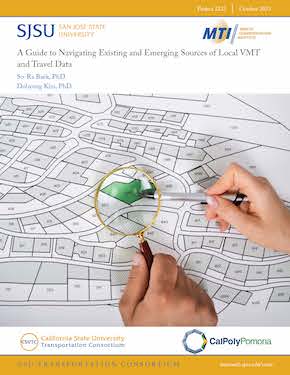- 408-924-7560
- mineta-institute@sjsu.edu
- Donate
A Guide to Navigating Existing and Emerging Sources of Local VMT and Travel Data
As the crisis of climate change looms, transportation policy in California continues to emphasize sustainability in land-use and transportation decisions. This report evaluates the implementation of two sustainability-focused policies (Senate Bill 375 and 743) by local governments and the current-state-of-the-practices by metropolitan planning organizations (MPOs) in assisting them in California. The research focuses on local governments’ access and use of vehicle miles traveled (VMT) and transportation data for achieving VMT and greenhouse gas (GHG) reduction by land-use planning. The research also examines the role of MPOs in providing needed transportation data, training, and technical support to its local members to help them quantify VMT impacts of land-use plans and projects. Through surveys and interviews of 539 city and county governments and 18 MPOs in California, the research team analyzes current practices. Findings include that local governments utilize automobile data more frequently than alternative modes, and do not heavily rely on MPOs for obtaining transportation data. Local governments recognized the need for more transportation data and were particularly interested in publicly available sources. The MPOs reported that VMT/annual average daily traffic data and origin-destination matrix were most frequently requested. More sophisticated data such as travel-time matrix and mode-share scheme were considered useful by the MPOs, while requests were very low. Based on the results of the conducted surveys, interviews, and our analyses, we developed a transportation data guide for local governments that could help them access data for achieving VMT/GHG emission reduction via land-use planning. The guide has two parts, one for general plan update and any land-use plans along with SB 375 and the other for VMT analysis for project-level California Environmental Quality Act reviews. The guide includes several different approaches that can be chosen and tried by local governments depending on their resource level and geographic, social, and physical characteristics. These findings can facilitate the access and use of transportation data to aid in sustainable land-use planning for the betterment of local communities and the planet.
SO-RA BAEK, PHD
Dr. Baek is an Associate Professor in the Department of Urban and Regional Planning at California State Polytechnic University, Pomona. She teaches demography and statistics for planning, GIS for planning, research approaches to planning, and local transportation planning. Her research interest is in understating the impact of urban forms and built environments in supporting active living, sustainable transportation, and promoting public health. Her recent research was on estimating ADU potential in the SCAG region using GIS with Dr. Kim as PI. Previously, she was an Assistant Professor in the Department of Urban and Regional Planning, University at Buffalo, State University of New York and worked on a Safe Routes to School project and other interesting projects in Western New York.
DOHYUNG KIM, PHD
Dr. Kim is a Professor in the Department of Urban and Regional Planning at California State Polytechnic University, Pomona. Since 2009, he has taught GIS applications in planning, local transportation planning, transportation methods and analysis, and planning research methods. Dr. Kim's research and practice focus on GIS applications in sustainable transportation planning, land-use and transportation dynamics, and public health and environmental justice in conjunction with transportation.
-
Contact Us
San José State University One Washington Square, San Jose, CA 95192 Phone: 408-924-7560 Email: mineta-institute@sjsu.edu






